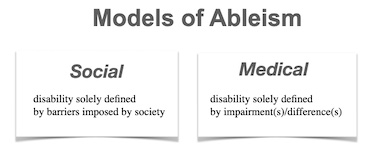Ableist Entrepreneurs Disadvantage Themselves Make Startup Life Easier and Better
 Ableist Entrepreneurs Disadvantage Themselves: Ableism is an intentional or unintentional system of power and privilege that ranks those with able bodies, intellects or minds over people with disabled ones.
Ableist Entrepreneurs Disadvantage Themselves: Ableism is an intentional or unintentional system of power and privilege that ranks those with able bodies, intellects or minds over people with disabled ones.
Even if they do recognize it, many entrepreneurs feel they have enough on their plate to worry about being ableist, or people with disabilities in general. This is especially so, since many mature businesses seem to be back-pedaling on DEI (Diversity, Equity and Inclusion)—anyway. Also, when reference is made to DEI, disability is often not included in a list that automatically includes race, gender, ethnicity or sexual orientation. So disability often tends to be ‘invisible’.
Describing someone as “disabled” labels them as such. On the other hand, referring to a person “with a disability” shows respect for the individual’s identity first. People with disability are individuals as much as anyone else and need to be respected as individuals, not as disabled.
There are good reasons why someone starting a new venture should avoid being an ‘ableist entrepreneur’. Probably the most important is that being an ableist entrepreneur will likely characterize the startup as one that does not respect people for who they are. The impact will be significant in terms of relationships with employees, customers and other stakeholders. The avoidance of ableism impacts the nature of the enterprise, with strategic and operational benefits to business outcomes.
Two Ways to View Disability
There are two main ways to view disability. The social model of disability says that it is an environmental problem and we need to make society more accessible so that all people can access society. The medical model states that a person’s disability is a personal issue that they need to overcome. Typically, this would be through medical intervention.
Of course, if the entrepreneur is starting a business that is covered by the Americans with Disabilities Act, it will inevitably require attention to some of the issues, such as physical access—and conforming to the law covering people with disabilities. However, that is more to do with architecture than attitude.
Ableist Entrepreneurs Disadvantage Themselves But Can Do Better
Beyond the cultural importance of respect for people, entrepreneurs can do better, since there are other practical advantages of avoidance of being an ableist entrepreneur. These are just a few:
- Among working age people (18-64), roughly a fifth of Americans are those with a disability, so they represent a neglected pool of talent available to employers. Don’t be ignorant: for instance, in the US about 20 per cent of people with disabilities have bachelor’s degrees or higher; research in 2003 found that 40 per cent of entrepreneurs were likely to be dyslexic; you might think that people with ADHD might not be good candidates for many jobs, but here are 25 that suit them (including entrepreneurship)—these are only a few examples of why stereotypes of people with disabilities in the workplace are misplaced.
- Ignorance of barriers to people with disability will likely be a loss to a startup business. For example, unless it had been pointed out to me, the concept of website accessibility, I would not have thought about the web accessibility problems that face, for example blind or deaf people.
- A venture that manifests little respect to employees will find recruitment more difficult; the obverse is also true. Indeed a business that has the reputation for respect and other characteristics such as fairness, or inclusion in its way of doing business will have the tendency to attract potential employees… and customers.
- An ableist entrepreneur might be tempted to tell an employee, “you’re being too OCD”, or might refer to someone as “handicapped”. Both could well result in negative consequences for the new enterprise. Think about it!
- You might want to visit the Workology website and read about 27 companies that hire adults with autism. Such behavior is likely to spill over into other HR and commercial operations.
- Although published in 2006, a national survey of consumer attitudes towards companies that hire people with disabilities found that 87 per cent of respondents specifically agreed that they would prefer to give their business to companies that hire individuals with disabilities.
- The situation is clearly developing, as revealed by a 2024 US Bureau of Labor Statistics report on Persons with a Disability: Labor Force Characteristics. In 2023, over 22 per cent of people with a disability were employed, the highest recorded ratio since comparable data were first collected in 2008. I’d assume that awareness of ableism—or behavior in the light of it— must be playing a part in this welcome development, even if there is still a long way to go.
A Successful Entrepreneur With A Disability Can Help Dispel Ableism
Daman Wandke MBA is both entrepreneur, university instructor, sailor—and also lives with a disability. He is
the founder and CEO of Wandke Accessibility, a company that helps organizations to create a more accessible and inclusive environment to ensure a positive customer experience. based in Bellingham, WA, the company is both a DOBE (Disability Owned Business Enterprise) and a B Corp.
Daman designed a course that is a two-hour and $37 investment yielding great benefits. Called Ableism 101, it is a means to recognize, understand and combat ableism in everyday life as well as an entrepreneur. The Ableism 101 course is concise, convincing and comes both from Daman’s professional knowledge and personal experience. He offers some excellent external resources and a reference to Crip Camp: a Disability Revolution (it’s on Netflix), a movie released in 2020 that was produced by Barak and Michelle Obama. At Camp Jened in the Catskills, in the 1960s, youngsters with disabilities learned to be self-sufficient and proud. Some campers went on to found the disability rights movement that helped pass the Americans with Disabilities Act of 1990.
First Steps to Reduce Ableism in Your Startup
A good first step would be to raise your own self awareness of the issue. Doing the Ableism 101 course would be an excellent start. More fundamental may be to acknowledge that the issue exists and how it may affect the early decisions of a new venture. From my own experience, I know that they very quickly establish the character of the new venture, and are progressively difficult to change.
Dana S Dunn, a psychology professor offers good advice, when he writes in an APA article, “If you have met one person with a disability, you have met one person with a disability. No individual represents a group. To believe otherwise is a form of stereotyping. A particular disability experienced by one person is experienced differently by another or others.”
Mission statements became popular in business, but my sense is that however well worked they are, they often remain more like pious aspirations that feel good to management who hope the high-minded hopes will look good to the outside world. Founders do not always exhibit their best personal traits, being so fixated on their passion. On the other hand a characteristic of all successful entrepreneurs is being dedicated to learning, in general and from their experience.
If you are empathetic, sincere and open, anyway, chances are high that your ableism will be less, or at least not rampant. Better still, try to demonstrate that you acknowledge people with a disability and presume their competence. You can try to do this in encounters with people with a disability and learn from reactions—good or bad! Work on language: I learned on my journey along this subject that when discussing the subject, there was an advantage in describing myself as ‘non-disabled’. Apart from anything else, it reminds me to stay awake to my ableist tendency.
If you want to read more about people with disability who start their own business, have look at my post on Startup Business with Disability. Be sure, as I am, that you will go on learning now that you have become aware of ableism issues, even when you try not to exhibit ableism.




